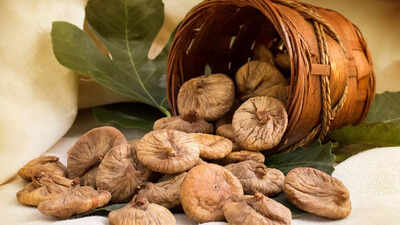ARTICLE AD BOX

Figs, commonly known as anjeer, are a delicious and nutrient-packed fruit that can do wonders for your health. Rich in fibre, antioxidants, and vital minerals such as potassium, magnesium, and calcium, figs support both digestion and heart health.
Regular consumption of figs helps ease constipation, regulate bowel movements, and maintain healthy cholesterol and blood pressure levels. Whether you enjoy them fresh, dried, soaked, or blended into smoothies, adding figs to your daily diet can naturally boost metabolism and overall well-being. If you often struggle with sluggish digestion or want to improve cardiovascular wellness, including figs or anjeer in your routine is a simple, tasty, and highly effective choice.
From soaked figs to smoothies: How to use figs daily
1. Soaked figs in the morningSoaking dried figs overnight helps soften them, enhancing their fibre absorption and digestive benefits. The soluble fibre in figs supports smooth bowel movement, prevents constipation, and feeds good gut bacteria. Regular consumption also helps flush toxins and regulate cholesterol levels.How to use: Place 2-3 dried figs in half a glass of warm water and soak overnight. Eat the softened figs and drink the water first thing in the morning.
This simple morning ritual gently cleanses the digestive system and kickstarts metabolism.
The Importance of a Strong Digestive Fire for Holistic Health in Ayurveda
2. Figs with warm milk before bedEating figs with warm milk before bedtime is excellent for digestion and sleep. The combination of fibre and minerals like magnesium and calcium in figs relaxes the body, supports digestion overnight, and helps relieve constipation naturally.How to use: Heat a cup of milk (dairy or plant-based) and add 2-3 dried figs. Let them steep for a few minutes until softened.
Drink the mixture 30 minutes before bed to promote gut health and improve sleep quality.3. Fresh figs in saladsFresh figs are rich in antioxidants, fibre, and minerals that aid digestion and promote heart health. When added to salads, they enhance nutrient diversity while naturally balancing blood pressure and cholesterol levels.How to use: Slice or halve fresh figs and toss them into salads with leafy greens, cucumber, cherry tomatoes, and seeds.
Dress with olive oil and lemon juice for a light, refreshing, and heart-friendly meal.4. Fig and oatmeal bowlAdding figs to oatmeal makes your breakfast fibre-rich and satisfying. The soluble fibre in both oats and figs supports gut motility, balances blood sugar, and maintains a healthy heart.How to use: Cook oats with milk or water and mix in 1–2 chopped figs (fresh or dried). Top with nuts and a sprinkle of cinnamon.
This wholesome breakfast fuels your day while supporting digestive and cardiovascular wellness.5. Fig smoothieA fig smoothie is an easy and delicious way to boost nutrient intake. It combines fibre, minerals, and antioxidants that promote digestion, hydration, and better heart function.How to use: Blend 2 dried or fresh figs with half a banana, oats, yoghurt, and water or milk. Add cinnamon for flavour. Enjoy it as a morning drink or midday snack for steady energy and gut balance.6. Fig and nut trail mixCombining figs with nuts creates a perfect snack loaded with fibre, healthy fats, and minerals that benefit both the heart and digestive system. It keeps you full for longer and helps control sugar cravings.How to use: Mix chopped dried figs with almonds, walnuts, pumpkin seeds, and raisins. Store in an airtight jar and enjoy a small handful as a healthy mid-morning or afternoon snack.7. Figs with yoghurt or curdPairing figs with probiotic-rich yoghurt enhances gut health and improves nutrient absorption.
This combination promotes a healthy microbiome and supports digestion naturally.How to use: Add 2-3 sliced dried or fresh figs to a bowl of plain yoghurt. Sprinkle with chia or flaxseeds for extra fibre. Enjoy this as a light dessert or breakfast bowl.8. Fig-infused waterInfusing water with figs makes hydration more nourishing. The minerals from figs, such as potassium and magnesium, help regulate blood pressure, improve digestion, and flush out toxins.How to use: Soak 2 dried figs, a few mint leaves, and a lemon slice in a jug of water overnight. Let it infuse and drink throughout the next day for better hydration and digestive support.9. Baked figs with honey and nutsBenefit: Baked figs offer a naturally sweet and heart-healthy dessert. The antioxidants in figs and healthy fats in nuts help maintain cholesterol balance and support digestion.How to use: Halve fresh figs, drizzle with honey, and top with crushed nuts like almonds or pistachios.
Bake at 180°C for 10 minutes and serve warm for a nutrient-rich treat.10. Fig chutney or spreadFig chutney is a delicious way to enjoy the fruit’s fibre and antioxidants while reducing the need for refined sugar in meals. It supports healthy digestion and adds flavour to your diet.How to use: Cook chopped dried figs with lemon juice, a pinch of salt, and ginger until soft. Blend lightly into a thick paste. Use it as a spread on toast or a side condiment with meals.Figs are a versatile and powerful addition to any diet, offering benefits that go far beyond taste. Whether soaked, blended, or baked, they contribute to improved digestion, balanced cholesterol levels, and overall cardiovascular health. Adding figs to your daily routine in different ways ensures a steady supply of fibre, antioxidants, and minerals that promote long-term wellness.Disclaimer: This article is for informational purposes only and should not be considered medical advice. Please consult a healthcare professional before making any changes to your diet, medication, or lifestyle.Also read | Which salt is best for high blood pressure? Know the effects of sodium and different salt types

 5 hours ago
7
5 hours ago
7









 English (US) ·
English (US) ·